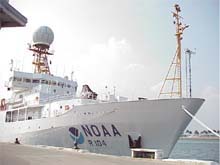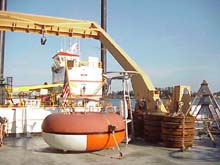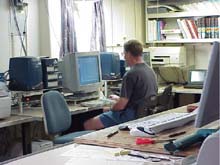
The NOAA Ship Ronald H. Brown at the dock in the Port of Miami. We will be departing at 1:00 pm on Tuesday, August 27, 2002, making our way to the Hudson Canyon by way of the Gulf Stream. Click image for larger view.

The view on the Ron Brown looking towards aft ship. The large round ring is a buoy that will be deployed during the next mission in the Pacific. These buoys are used to capture ocean data that can be thought of as underwater “weather-like” conditions. The data that is collected has applications such as predictions of future El Nino events. Click image for larger view.

The computer lab aboard the Ron Brown where much of the sea floor mapping data will be sent, analyzed and quality assured. The Hudson Mission is mapping intensive, so this lab will be in use 24 hours a day, seven days a week, once the data collection has begun. Click image for larger view.
Port of Miami
August 27, 2002
Lisa M. Weiss, Watershed Coordinator
Jacques Cousteau National Estuarine Research Reserve
I begin the daily logs the morning of our departure from the dock at the port Miami. We are scheduled for “all hand on deck” at 1200 (12:00 pm) and are set to depart for our trip at 1300 (1:00 pm). Both this morning and yesterday have been busy for the ship’s crew, as they load gear and supplies for our exploration, as well as future explorations over the next few months. It is important that all gear is stowed properly and lashed down correctly so it will not roll around on deck as the ship moves at sea.
When I arrived at the ship yesterday, I was shown to my stateroom, or berth as they call it on the ship, and given a general tour of the place that I will know as “home” for the next 20 days. To be quite honest, I was very impressed by the accommodations, amenities and scientific laboratories that are in place on this vessel, but then again, I remind myself that this is home to the ship’s crew and officers all the time. I hope that in the pictures I have included with the log, you will get a sense for what it will be like living onboard the Ron Brown for the next few weeks.
Rooms and places onboard a ship take on a new name out at sea. The front of the ship is called “forward” and the back is called “aft.” The right side of the side is known as “starboard” and the left is called “port." The dining room is known as the “galley” and the bathrooms are called “heads.” Each level of the boat is called a “deck” instead of a floor, and the living room is known as the “rec room.” I suppose that these terms will come more natural to me as we “get underway,” but I have been corrected already a few times for saying the room is “on the third floor!”
Members of the scientific community readied themselves yesterday by setting up their supplies in the labs and ensuring that all the equipment that they would need was in working order and ready for data collection and processing. Because our exploration is so mapping intensive, the computer lab will be used extensively, and the programs that will be receiving and storing the data must function properly. Thankfully, there is a technical computer guru on board who has been busy with data cables and networking. He will ensure that the mapping data that is collected will be properly stored and saved for all the processing that is planned.
Because we will be underway for 20 days without coming into port, the crew of the ship has to be sure that when we leave the dock, everything that we will need over the next three weeks is in place, functioning properly, and planned well. The ship’s officers were busy yesterday planning our course of sail, capitalizing on the movement of the Gulf Stream for assistance in heading North. When they found out that I was from Rutgers University, they told me that they used the LEO-15 data (data developed at Rutgers) to help them locate the flow of the Gulf Stream, and therefore now know in which directions to set the ship’s track.
The on-deck crew is finishing the lashing and securing of the equipment on deck and ensuring that the rescue boat is ready should it need to be deployed. The engineering crew works to ensure that we have electricity, warm showers, working sinks and toilets, and functioning air conditioning (a big must here in Miami!) Believe it or not, the Ron Brown can make its own fresh water! I have been told that the engineers are not people that we want to get on our bad side, as they are responsible for making sure that we are comfortable, have power and have fresh water for our operations! I will be sure to keep that in mind.
I hope that you have a better sense for what life will be like on the Ron Brown for the next 20 days. I am not sure that I even know what to expect, but I know that the ship’s crew and officers are here to make sure that our scientific mission is a success and comfortable at the same time. Please email me questions as we go along, and I will do whatever I can to make sure that they are answered. The next time that you hear from us, we will be offshore somewhere in the Atlantic, heading towards our destination, the Hudson Canyon. Best wishes to all you land lovers!
Sign up for the Ocean Explorer E-mail Update List.























